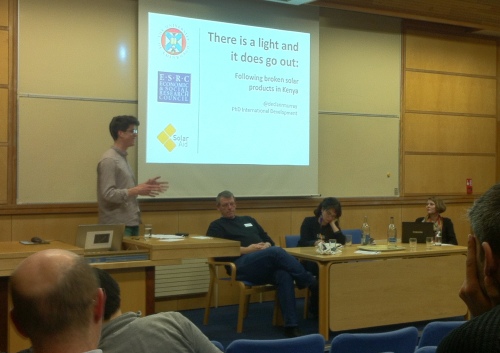On Saturday, the 7th of March the University of Oxford held a “Researching Africa Day” at St Antony’s College. It was an opportunity for PhD/DPhil students to present research related to “imagining welfare in contemporary Africa”, and Edinburgh was well-represented by four speakers. It was a really engaging day, with thought-provoking comments from several Oxford professors who acted as discussants, and a barrage of questions from the audience. The all-important networking happened at the pub afterwards. I heard someone declare it “one of the best student conferences ever”.
The presenters from Edinburgh:
Megan Canning (International Development) who presented on Labour, Livelihoods and Gender Inequality: Winners and Losers in the Malawian Sugar Industry:
Oxford’s Researching Africa Day was a great opportunity to present in public for the first time the findings from my 2014 fieldwork forming a pilot study for my PhD. The questions which surfaced in the panel discussion were useful for me in reflecting on my methods and frameworks at a critical stage before going back to the field. It was also an important opportunity to reflect on the work of other early researchers with some relevance to my own work, such as Duncan Money’s (Oxford) historical account of corporate sponsored leisure activities on the Zambian Copperbelt, or Hannah Dawson’s (Oxford) study of work and unemployment amongst male youths in South Africa. I also really appreciated the chance to listen to my fellow University of Edinburgh colleagues present, which helped me to better understand some of the fantastic research being conducted by friends right here in CAS.
Ismaila Ceesay (African Studies) who presented on Chanting to Hustle: a Study of the Income Earning Activities of Urban Youth in Gambian Cybercafes:
The Researching Africa Day event provided me and other emerging scholars the opportunity to share our work with a wider academic audience. The quality of the presentations were brilliant and thought-provoking. The presenters successfully reflected on the changing nature of welfare in Africa and how it is provided. The diversity of the themes covered in the various panels (epidemics, transitional justice, leisure, colonial science, gender etc.) demonstrated the interdisciplinary approach to welfare provision in contemporary Africa. The quality of feedback from Prof. Jonny Steinberg, my panel discussant, and the audience were of the highest quality. In particular, the insights gained from these interventions enhanced my overall approach and understanding to studies of youth in Africa in terms of how they are viewed and their transition to adulthood.
I was greatly fascinated by Dr. Moguerane’s closing remarks which reflected on and engaged with the various presentations in a way that merged the different themes, thereby producing a single disciplinary approach to ‘Imagining Welfare in Contemporary Africa’.
Laura Martin (African Studies) who presented on Institutionalising Local Transitional Justice: Examples from Sierra Leone.
I presented research on the role and impact of Fambul Tok in rural Sierra Leonean communities. The conference was a good opportunity for presentation practice in a slightly more informal setting. It was also great to interact with other scholars at a similar stage and see what other types of research are happening in African Studies currently.
Declan Murray (International Development) who presented on There is a Light and it Does Go Out: Following Broken Solar Products in Kenya
Research in Africa Day was the first conference I’ve presented at, and whilst I don’t know when I’ll next have to make the solar products of my PhD relate to old Zambian railway girders or photos of contemporary Cape Town (the foci of my co-panelists), the day definitely forced me to think about my research in new ways.
Well done,
Maurice Hutton

